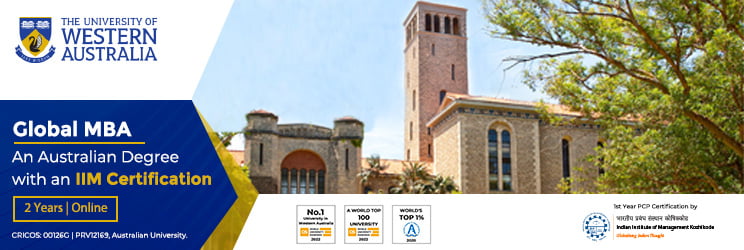An Ideal Executive MBA Programme: 5 Top Features to Help You Choose

Today, more and more people are pursuing various types of Executive MBA (EMBA) programs rather than traditional MBAs. A majority of them happen to be senior corporate executives or working professionals. So, why are they choosing an executive MBA program? The rapid pace of digital and technological innovation, the risk of losing jobs to AI, and an increasing skill gap have made an executive MBA the need of the hour. EMBA courses are gaining popularity due to the lucrative career opportunities that await you at the end of the course. This is quite evident in the 2022 Executive MBA Council (EMBAC) survey that says 41% of professionals who completed the course secured a job promotion.
This blog thus helps you learn more about an executive MBA program and how you can choose the same to advance your career.
Executive MBA Program Features
At first glance, an executive MBA appears similar to a traditional one. Simply put, an EMBA is a postgraduate business management course that teaches management skills, business analytics, finance, leadership, and other relevant skills.
However, unlike the traditional full-time, on-campus MBA courses, an executive MBA is usually part-time and for a shorter duration. Its purpose is to allow working professionals flexibility and self-paced learning. It helps them focus on their current job and upskill without taking a career break. The key features of an executive MBA program are:
- It is an accelerated MBA program for professionals with a post-qualification experience of 3-5 years
- EMBA focuses more on practical skills and training than theoretical concepts
- The classes are usually flexible to accommodate the schedule of the learners
- It has an integrated curriculum that focuses on teaching core business disciplines and facilitates the holistic development of professionals.
- EMBA courses offer leadership development, and learners get an opportunity to connect with other like-minded professionals and build their network
Who Should Study EMBA?
The EMBA program is specifically designed for corporate executives or working professionals with at least four to five years of experience. EMBA courses are best for people who want to move up the career ladder, become better managers or leaders, and gain specialization to switch careers. They are typically exclusively intended for executive-level professionals such as CEOs, CMO, CFO, and CTO. Entrepreneurs or business owners can also pursue an EMBA to enhance their leadership skills and gain industry insights. To sum it up, the following people should study EMBA:
- Professionals who have 3-5 years of working experience and want to enhance their business and technical skills
- Those who want to get promoted to senior-level management or leadership roles in an organization
- Entrepreneurs who want to gain business acumen and grow their business
- People who want to explore the international market and want to learn relevant skills
ALSO READ: What is Business Management? How to be a Good Business Manager
An Insight Into the Types of Executive MBA Programmes
There is no ideal executive MBA program tailored for all professionals. It depends on professional goals, schedules, and learning outcomes. The following are the most popular types of executive MBA programs based on the course structure and mode of learning:
Full-Time
This is the most common EMBA program for working professionals. However, it has an accelerated curriculum as compared to regular full-time MBA programs. The course duration is usually one year, so professionals do not have to take a long career break to upskill themselves. In most cases, a full-time executive MBA program has a cohort model with a limited number of working professionals so that they can learn skills and network with other professionals.
Online
It offers remote training to professionals who can’t attend classes in person. Online EMBA courses are conducted through online platforms and virtual classrooms. These include both recorded and live classes to offer self-paced learning. Moreover, online EMBA offers multiple learning opportunities through webinars, group discussions, and group projects.
Weekend EMBA
This is the best executive MBA program for professionals with a tight schedule. As the name suggests, The classes take place in the evenings or on weekends so that learners can accommodate their study plans and work schedule. The course is usually completed in three to five years.
ALSO READ: What are the Roles and Responsibilities of a Business Manager
FAQs
1. How Does an Executive MBA Benefit a Working Professional in India?
According to Statista, the employability rate of MBA graduates increased from 47% in 2021 to 60% in 2022. Clearly, this explains the high demand for MBA graduates in India. You can benefit from an executive MBA program in India by upskilling while pursuing your job. It also helps gain leadership and other crucial business skills, making professionals eligible for senior-level jobs. Moreover, executive MBA programs provide networking opportunities, which help receive guidance and job recommendations.
2. What Should One Consider When Choosing an Executive MBA Program?
The learning outcome of the course is the most important factor one should consider when choosing an executive MBA program. It should align with one’s professional as well as personal goals. Further, one should consider other factors such as course instructors, partnerships, accreditation, and costs.
3. What is the Average Salary Increase for Executive MBA Graduates?
As per the Executive MBA Council (EMBAC) survey, EMBA graduates got a 17.7% increase in average salary in 2022. In 2021, the average salary increase for EMBA graduates was 14.7%.
By Sneha Chugh






